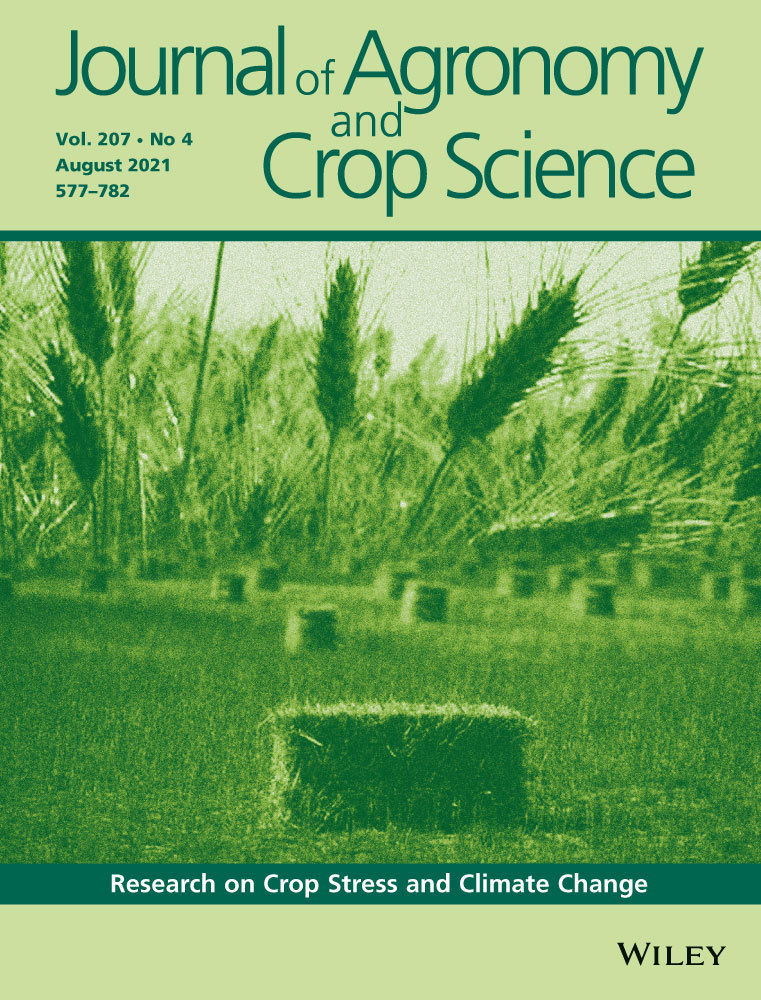Ver ítem
- xmlui.general.dspace_homeCentros Regionales y EEAsCentro Regional Santa FeEEA ReconquistaArtículos científicosxmlui.ArtifactBrowser.ItemViewer.trail
- Inicio
- Centros Regionales y EEAs
- Centro Regional Santa Fe
- EEA Reconquista
- Artículos científicos
- Ver ítem
Mesophyll conductance modulates photosynthetic rate in cotton crops exposed to heat stress under field conditions
Resumen
Cotton is often exposed to high temperatures during the reproductive stage, which can negatively affect its productivity. The objectives were to: i) test whether heat stress impacts during the reproductive stage on photosynthesis are due to instant temperature effects or to acclimation produced during the heat stress period, ii) evaluate the role of stomatal and mesophyll conductance on net photosynthetic rate and iii) identify possible interactions
[ver mas...]
Cotton is often exposed to high temperatures during the reproductive stage, which can negatively affect its productivity. The objectives were to: i) test whether heat stress impacts during the reproductive stage on photosynthesis are due to instant temperature effects or to acclimation produced during the heat stress period, ii) evaluate the role of stomatal and mesophyll conductance on net photosynthetic rate and iii) identify possible interactions between heat stress and different source/sink ratios during the reproductive period. Two field experiments were carried out in 2016 (Exp. 1) and 2017 (Exp. 2). Two heating treatment periods were imposed as follows: pre-flowering between 15 days before flower bud and flowering (H1) and post-flowering between flowering and 15 days later (H2). Each treatment had a control group (C1 and C2, respectively). In Exp. 1, two genotypes with contrasting crop cycles were compared. In Exp. 2, 50% defoliated plants (D-) were compared with intact plants (D+) under the same temperature treatments using one genotype. Average daily maximum temperature of heated treatments for both experiments was 37.9 ± 0.79ºC, 5.8ºC higher than the controls. Independently of the period, thermal stress had a negative impact on photosynthesis in both genotypes through an acclimation response, reducing it up to 35% compared with controls when heath-stressed and control plants were measured at the same temperature. Instant responses to temperature were not observed. This decrease was mainly determined by mesophyll conductance, and no recovery was observed 15 days after the end of treatments. Photosynthesis depletion was conditioned by the source/sink ratio, showing a complete recovery only in defoliated plants. It is concluded that thermal stress had a negative acclimation impact on photosynthesis, without responses to changes in instant temperature, and this acclimation is modulated mainly by mesophyll conductance.
[Cerrar]

Autor
Mercado Álvarez, Kelly;
Bertero, Héctor Daniel;
Paytas, Marcelo Javier;
Ploschuk, Edmundo L.;
Fuente
Journal of Agronomy and Crop Science (First published: 04 August 2021)
Fecha
2021-08
Editorial
Wiley
ISSN
1439-037X
Formato
pdf
Tipo de documento
artículo
Palabras Claves
Derechos de acceso
Restringido
 Excepto donde se diga explicitamente, este item se publica bajo la siguiente descripción: Creative Commons Attribution-NonCommercial-ShareAlike 2.5 Unported (CC BY-NC-SA 2.5)
Excepto donde se diga explicitamente, este item se publica bajo la siguiente descripción: Creative Commons Attribution-NonCommercial-ShareAlike 2.5 Unported (CC BY-NC-SA 2.5)

